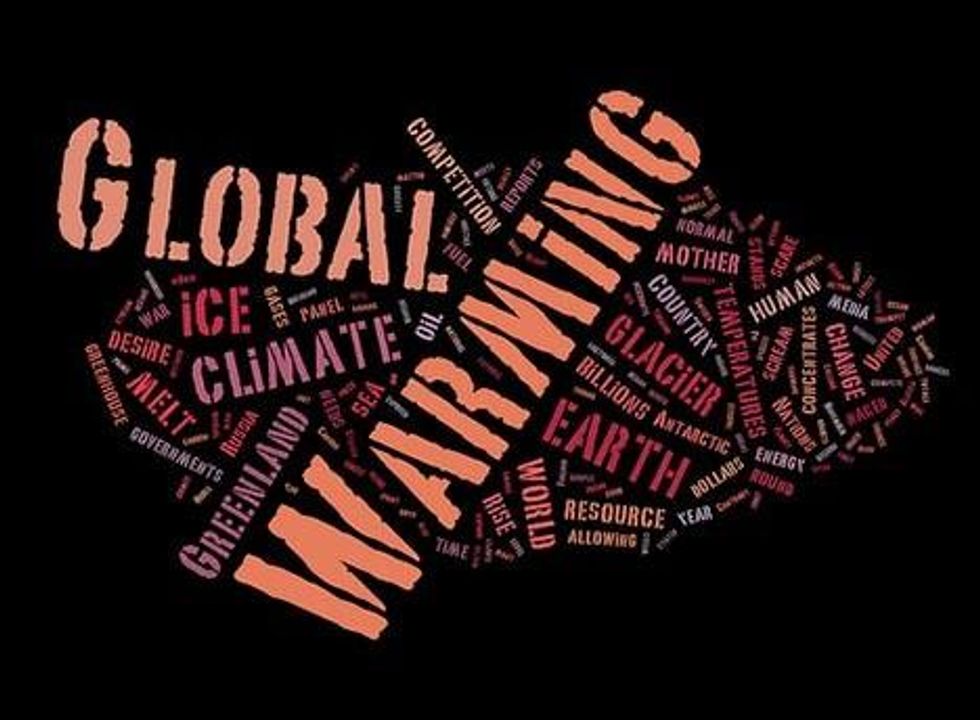New research from Europe predicts a 4oC global temperature rise is well within the range of possibility this century, and that even if the worst predictions of climate change disasters do not materialize the cost of this global change will mean "human disaster" for the planet.
As The Guardian's Fiona Harvey reports, the study--which appears in the journal Nature Geoscience-- shows that as the world's oceans reach their capacity to absorb much of the world's carbon pollution, the increased temperature rise to the atmosphere will create "catastrophe across large swaths of the Earth, causing droughts, storms, floods and heatwaves, and drastic effects on agricultural productivity leading to secondary effects such as mass migration."
Climate research--which studies the complex interplay between global temperatures, the oceans, the atmosphere, and the world's regional biospheres--is not a science with either a winner or a single answer.
Ultimately, the science is one of deeply informed speculation--derived from complex computer modeling and close examination of the historic climate record--that seeks to unpack the complexity of the Earth's life-supporting dynamics.
"Climate is a complicated system but there is no change at all in our understanding of climate sensitivity [to carbon dioxide] and where the climate is headed," said renowned NASA scientist James Hansen recently. "Our understanding of sensitivity is based on the Earth's history, not on climate models, and we have good data on how the Earth responded in the past when carbon dioxide changed. So there is no reason to change the forecast for the long term."
All studies don't agree, but what they offer collectively is an accepted view of what's likely, according to the peer-reviewed work from a world-wide community of scientists committed to understanding the physics of our planet's overall health.
Later this year, the Intergovernmental Panel on Climate Change (IPCC), will release their latest, comprehensive report on what the scientific community believes is the current state of climate change and what the likely path forward looks like given the available research and current scientific consensus.
In the meantime, the latest study to emerge--this one from researchers at Oxford and Max Planck Institute for Meteorology in Hamburg, Germany--says humanity is in trouble. Big trouble.
As Harvey reports:
Alexander Otto, at the University of Oxford, lead author of the research, told the Guardian that there was much that climate scientists could still not fully factor into their models. He said most of the recent warming had been absorbed by the oceans but this would change as the seas heat up. The thermal expansion of the oceans is one of the main factors behind current and projected sea level rises. [...]
Otto said the study found that most of the climate change models used by scientists were "pretty accurate". A comprehensive global study of climate change science is expected to be published in September by the Intergovernmental Panel on Climate Change, its first major report since 2007.
Jochem Marotzke, professor at the Max Planck Institute for Meteorology in Hamburg and a co-author of the paper, said: "It is important not to over-interpret a single decade, given what we know, and don't know, about natural climate variability. Over the past decade the world as a whole has continued to warm but the warming is mostly in the subsurface oceans rather than at the surface."
Other researchers also warned that there was little comfort to be taken from the new estimates - greenhouse gas emissions are rising at a far higher rate than had been predicted by this stage of the 21st century and set to rise even further, so estimates for how much warming is likely will also have to be upped.
___________________________________________________




